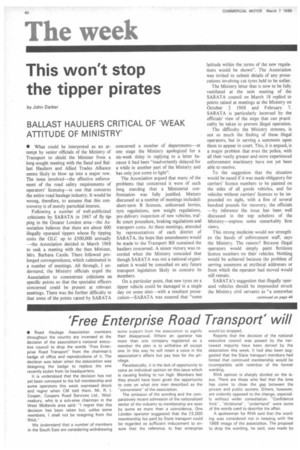This won't stop the tipper pirates
Page 42

If you've noticed an error in this article please click here to report it so we can fix it.
by John Darker
BALLAST HAULIERS CRITICAL OF 'WEAK ATTITUDE OF MINISTRY'
• What could be interpreted as an attempt by senior officials of the Ministry of Transport to shield the Minister from a long-sought meeting with the Sand and Ballast Hauliers and Allied Trades Alliance seems likely to blow up into a major row. The issue involved—the effective enforcement of the road safety requirements of operators' licensing—is one that concerns the entire road haulage industry. It would be wrong, therefore, to assume that this controversy is of merely parochial interest.
Following a number of well-publicized criticisms by SABATA in 1967 of fly tipping in the Greater London area—the Association believes that there are about 600 illegally operated tippers whose fly tipping costs the GLC up to £500,000 annually —the Association decided in March 1968 to seek a meeting with the then Minister, Mrs. Barbara Castle. There followed prolonged correspondence, which culminated in a number of meetings. All through, I understand, the Ministry officials urged the Association to concentrate criticisms on specific points so that the specialist officers concerned could be present at relevant meetings. There was the further difficulty in that some of the points raised by SABATA concerned a number of departments—at one stage the Ministry apologized for a six-week delay in replying to a letter because it had been "inadvertently delayed for a while in another part of the Ministry and has only just come to light".
The Association argued that many of the problems that concerned it were of such long standing that a Ministerial confrontation was fully justified. Matters discussed at a number of meetings included: short-term B licences, unlicensed lorries, tyre regulations, new weight regulations, pre-delivery inspection of new vehicles, traffic court procedure, braking regulations and transport costs. At these meetings, attended by representatives of each district of SABATA, the hope that amendments would be made to the Transport Bill sustained the hauliers concerned. A minor victory was recorded when the Ministry conceded that though SABATA was not a national organization it would be consulted on any future transport legislation likely to concern its Members.
On a particular point, that new tyres on a tipper vehicle could be damaged in a single day on some sites—with a resultant prosecution—SABATA was assured that "some latitude within the terms of the new regulations would be shown". The Association was invited to submit details of any prosecutions involving cut tyres held to be unfair.
The Ministry letter that is now to be fully ventilated at the next meeting of the SABATA council on March 18 replied to points raised at meetings at the Ministry on October 2 1968 and February 7. SABATA is particularly incensed by the officials' view of the steps that can practicably be taken to prevent illegal operation.
The difficulty the Ministry stresses, is not so much the finding of these illegal operators, but in serving a summons upon them to appear in court. This, it is argued, is a major problem that even the police, with all their vastly greater and more experienced enforcement machinery have not yet been able to resolve.
To the suggestion that the situation would be eased if it was made obligatory for carriers' licence numbers to be painted on the sides of all goods vehicles, and for vehicles without carriers' licences to be impounded on sight, with a fine of several hundred pounds for recovery, the officials —by inference the issue has been well discussed in the top echelons of the Ministry—express some remarkably firm views.
This strong medicine would not strengthen the hands of enforcement staff, says the Ministry. The reason? Because illegal operators would simply paint fictitious licence numbers on their vehicles. Nothing would be achieved because the problem of serving summons at mythical addresses or from which the operator had moved would still remain.
SABATA's suggestion that illegally operated vehicles should be impounded struck the Ministry civil servants as "a somewhat












































































































































































